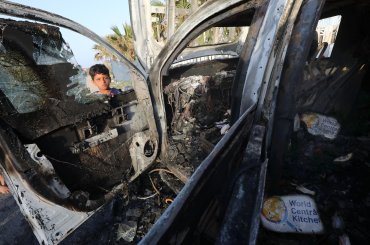Anyone who thinks that the National Public Radio’s international correspondent in Jerusalem, Daniel Estrin, is giving them unbiased reports is sadly mistaken. Estrin’s slant is subtle, not always as obvious as his counterparts at the New York Times, but a quick look at his recent work is revealing.
Let’s start with Estrin’s March 15 report, back when Benny Gantz had a chance to form a coalition government that would have ended Benjamin Netanyahu’s reign. Estrin noted that Gantz considered building a minority government dependent on the Joint List, the group of parties that won overwhelming support from the 20 percent of Israelis of Palestinian background. He reported that Netanyahu tried to block the prospective government by calling the Joint List “terror sympathizers,” and, for good measure, he added a statement from Netanyahu’s Likud party that also described them as “terror supporters.”
They teach you on your first day of journalism school to report both sides, especially after inflammatory comments like these. But NPR listeners did not get to hear Ayman Odeh or other Joint List leaders rebut Netanyahu’s lies, or learn about Odeh’s passionate commitment to nonviolence in the tradition of Dr. Martin Luther King Jr.
Last September, during the previous Israeli election campaign, Estrin was able to track down Ayman Odeh, and gave him a couple of short sentences to say that the Joint List was willing to support an anti-Netanyahu government. But then NPR’s man on the spot offered a less than honest explanation for why Arab Israelis are almost never allowed in Israeli governments:
And since they [Arab citizens of Israel] don’t want to be involved in policies targeting Palestinians in the West Bank and Gaza, they’ve stayed out of Israeli Cabinet posts.
There is probably some truth to this statement, but it hardly the major explanation for Israel’s electoral apartheid. Racism among Israeli Jews, stoked most recently by Benjamin Netanyahu, has for decades meant that any Jewish politician or political party who allied with the Palestinian citizens of Israel would be punished at the polls. If Estrin doubts this, he should take his microphone into some right-wing Jewish areas and ask for their unvarnished opinions about their Palestinian co-citizens, which will be shocking and eye-opening for his NPR listeners.
Estrin’s slant is even more dangerously misleading in his March 31 report on how the coronavirus is spreading across Israel and Palestine. He notes that the risk is probably greatest in Gaza. But just look at how he described the territory for his NPR listeners:
. . . it’s packed with 2 million Palestinians. It’s ruled by an Islamist group. It’s blockaded by neighboring countries. And its health system has just been completely overburdened after years of war and power cuts and shortages.
The bias here is breathtaking. Gaza is mainly blockaded by Israel, not mysterious “neighboring countries,” and Israel pressures Egypt into going along. “After years of war” is a nice touch that removes the responsibility from anyone: a more accurate description is “after years of regular massive Israeli attacks, by land, air and sea.” Estrin’s aim is obvious — try to exonerate Israel from its responsibility for the humanitarian crisis that already made Gaza unlivable even before the pandemic started to bite.
Let’s contrast NPR’s evasiveness with the truth about Gaza and coronavirus. This site the other day ran a post in which the headline warned: “Bring maximum pressure on Israel to end siege or Gaza could become a graveyard.” And in The Nation, the estimable Neve Gordon showed in detail that “Israel. . . has for decades intentionally weakened the economy and health of the world’s largest open-air prison.” There’s nothing like this in the NPR report.
National Public Radio’s pretentious, Olympian tone, although sometimes irritating, is usually harmless. But when it comes to Israel/Palestine, its listeners are simply not being told the truth.



Thank you, Mr North. My sentiments regarding Estrin, too. Newspeak at its best.
It has to be said he is hardly the first (or only) NPR (or BBC World Service) “reporter” or “commentator” that covers for Israel (Occupied Palestine) by his choice of words. Words which give the strong impression that Hamas is the armed equivalent of the IDF, for instance; and at the same time that it is an illegitimate, terrorist group forced upon the Gaza Palestinians. Hamas’s “rockets” (sort of souped up fireworks) are always spoken of as if they were the equivalent of Israeli bombs and missiles.
Never, on either NPR or BBC World Service, do we hear of the widespread and deeply rooted zionist racism that infects almost all of Israel (Occupied Palestine). Of the language used by zionists when speaking of Palestinians – language all too familiar, surely, to those Israelis who were similarly denigrated by the Nazis. Never do we hear of the razing of Palestinian homes, destruction of their farmlands, their illegitimate imprisonment and torture, their being shot at will (including the deathly IDF sniping of marchers over this past year’s peaceful protests in Gaza): Never.
Presumably these horrendous, inhumane, illegal actions by the zionist state and zionist actors cannot be whitewashed by Newspeak so readily?
The only NPR reporter in that part of the world who is consistently low bias is Peter Kenyon, usually based in Istanbul.
Lonscar’s comments are dead on.
In the late 80’s I went to DC, to NPR’s old location on ‘M’ Street, with a placard saying NPR was not covering the Palestine Question fairly. A woman came over to me and said, “My husband works in there and he says the same thing. A lot of them think that but there is nothing they can do about it.”
Not long thereafter a correspondent at ABC did a piece that was surprising in its balance. I called him to say thanks and said I bet he got a lot of flack. He laughed and said, “We should share a glass of wine someday.” In that conversation, he observed how the conflict was covered by Public Broadcasting set the tone for media in general and correspondents measured their coverage accordingly.
In my judgment, our greatest failure has been not holding PBS and NPR to journalistic standards of balance and fairness not only on the Palestine Question but on the ME in general. I’d say, for example, not yet has NPR reporte the origins of the Syria War fairly. Our failure with Public Broadcasting is particularly tragic because they regularly go to the public for funding while claiming to do journalism at its best. The door is wide open for the public to demand accountability. So many voters get their information there.
James North deserves our gratitude. FAIR periodically addresses the problem. If we don’t demand better, we deserve what we get. The Public Editor at NPR, 202-513-3246. The Public Editor at the Newshour, 202-739-5290. Better yet contribute and encourage Mondoweiss and FAIR to regularly monitor coverage, especially worthy news that is omitted..
Also, I reason that as many in the media, including executives, are Jewish, the seemingly random spilling of Jewish blood by Palestinian lone wolves, uncondemned and even rewarded, generates sympathetic perspectives. That is best a thing of the past. We need a unilateral ceasefire by Israelis and Palestinians as well.
Thanks for this analysis!
For what it’s worth, over the past 10+years of listening to On the Media (Brooke Gladstone and Bob Garfield), I’ve always been frustrated with the show that is generally so good at identifying bias and nuance, but fell so far short when it comes to media coverage of I/P.
So my expectations were low when I heard Bob interview Steve Hendrix last week about Covid 19 in Israel. But to my surprise, Bob had a few well targeted questions about the nature of Israeli “democracy” in general and that made me think the ground might be shifting a little bit. (https://www.wnycstudios.org/podcasts/otm/episodes/when-coronavirus-isnt-only-crisis)
Also, Lourdes Garcia-Navarro I think has a generally good understanding of the situation (although it didn’t always get through her editors back when she was in Jerusalem).
Scott Simon… I can’t even listen to his segments on anything related to Israel. The bias he brings to the table is stomach turning and often results in my shouting at the radio.
Not NPR exactly (although you can listen to it via NPR One, season 7 of the Groundtruth podcast was a three part series of Christian Zionism and the way it shapes US I/P policy – really great).
If we’re talking media, I think there has been a shift in the last few years. Time, which always seemed pretty mainstream to me, just ran a piece about the blockade in light of the virus:
https://time.com/5814944/gaza-covid19-israel-palestinians/
It’s still he-said-she-said but at least some points of view are being aired out – the article contains a link to a piece by Noam Chomsky (“Noam Chomsky: My Visit to Gaza, the World’s Largest Open-Air Prison”). Time! Who woulda thunk it?
https://truthout.org/articles/noam-chomsky-my-visit-to-gaza-the-worlds-largest-open-air-prison/